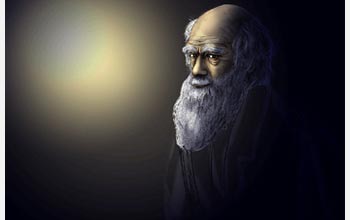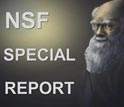News Release 09-022
Scientists' Next Big Discoveries Predicted in Online Report on the 150th Anniversary of "On The Origin of Species"

An NSF online report asks how "On the Origin of Species" impacts science and society.
February 12, 2009
View a promotion of the National Science Foundation's new special report, "Evolution of Evolution: 150 Years of Darwin's On the Origin of Species."
This material is available primarily for archival purposes. Telephone numbers or other contact information may be out of date; please see current contact information at media contacts.
On Nov. 24, 2009, Charles Darwin's "On the Origin of Species" will be 150 years old, but the National Science Foundation is already commemorating the event with an online report released today on the author's 200th birthday.
The report, "Evolution of Evolution: 150 Years of Darwin's On the Origin of Species," asks a basic question: How did "Origin" influence science and society during the last 150 years? An international team of evolution experts take up the question and their answers lead intellectually curious web surfers on a wide ranging journey through "Origin's" impacts on Anthropology, Biology, Geosciences, Polar Sciences and even Astronomy. There's also a section dedicated to the author himself in the report.
One of the more intriguing questions answered by the scientists had to do with what they saw as the next big scientific discovery, eliciting such predictions as discovering life on other planets and discovering the Antarctic ice sheet is alive. The query was one of many posed in a series of online videos that examine Darwin's impacts on science's understanding of human evolution, global climate change, the origin of life and other questions.
Twelve researchers from the United States and London appear in the special report, each having written accompanying essays that look at "Origin's" impacts on scientific discovery. The researchers are:
- David Devorkin
Smithsonian Air and Space Museum - Richard Lenski
Michigan State University - Ross MacPhee
American Museum of Natural History - Ron Numbers
University of Wisconsin-Madison - Massimo Pigliucci
Stony Brook University - John Priscu
Montana State University - Marsha Richmond
Wayne State University - Jim Secord
University of Cambridge - Lynn Soreghan
University of Oklahoma - Judy Totman Parrish
University of Idaho - Ken Weiss
Penn State University - Tim White
University of California, Berkeley
The beautifully illustrated report also features a substantial timeline of scientific discoveries that pays special attention to events involving evolution spanning the decades from Nicolaus Copernicus's first scientific treatise supporting the idea that the sun is at the center of the Solar System in 1543 to the faster sequencing of genomes in 2007.
Evolution of Evolution is ideal information for reporters, general readers, and students of all ages, who have even a passing interest in the impact of "On the Origin of Species" on science and society. The report is posted at: http://www.nsf.gov/news/special_reports/darwin/.
-NSF-
-
View Video
What does Darwin's "On the Origin of Species" mean to you?
Credit and Larger Version
Media Contacts
Bobbie Mixon, NSF, (703) 292-8485, email: bmixon@nsf.gov
Related Websites
Evolution of Evolution: 150 Years of Darwin's On the Origin of Species: http://www.nsf.gov/news/special_reports/darwin/
The U.S. National Science Foundation propels the nation forward by advancing fundamental research in all fields of science and engineering. NSF supports research and people by providing facilities, instruments and funding to support their ingenuity and sustain the U.S. as a global leader in research and innovation. With a fiscal year 2023 budget of $9.5 billion, NSF funds reach all 50 states through grants to nearly 2,000 colleges, universities and institutions. Each year, NSF receives more than 40,000 competitive proposals and makes about 11,000 new awards. Those awards include support for cooperative research with industry, Arctic and Antarctic research and operations, and U.S. participation in international scientific efforts.
Connect with us online
NSF website: nsf.gov
NSF News: nsf.gov/news
For News Media: nsf.gov/news/newsroom
Statistics: nsf.gov/statistics/
Awards database: nsf.gov/awardsearch/
Follow us on social
Twitter: twitter.com/NSF
Facebook: facebook.com/US.NSF
Instagram: instagram.com/nsfgov



